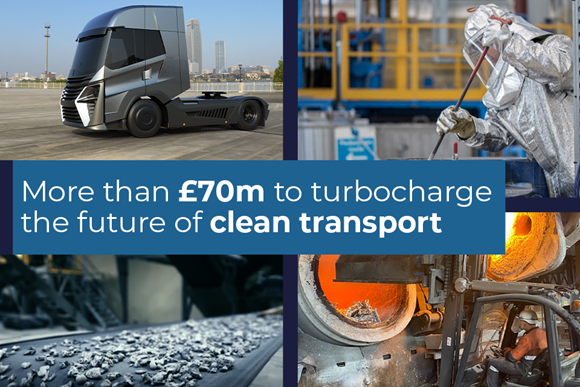A world-first, Essex-led, project to develop a methane-powered, off-road, heavy tractor is benefitting from a share of £73 million in new funding for game-changing clean transport technologies. CNH Industrial have been awarded £15.6 million as they aim to create a heavy agricultural vehicle that can harness the potential of liquid fugitive methane – which is produced from livestock slurry – as a renewable fuel in rural settings.
Methane from farm waste would normally escape into the atmosphere, where it acts as a powerful greenhouse gas. CNH Industrial’s ATLAS project looks to capture that gas, and put it to use as a fuel source.
The funding announced today (Friday 2 December) forms part of joint government and industry backing for projects right across the UK, in support of ambitions to build an end-to-end supply chain for zero-emissions vehicles (ZEVs) in the UK.
Business Secretary Grant Shapps said:
“Our automotive industry is a world-leader, creating jobs whether in Essex, Somerset or Glasgow. Seizing the potential from new technologies will be a key part of its future success, while also making our roads cleaner, greener and more affordable.
“Today’s multi-million-pound boost – created by Government working hand-in-hand with industry – will put these firms in pole position to pioneer these innovations, staying at the cutting edge of the global race for decades to come.”
CNH Industrial President Agriculture Derek Neilson said:
“CNH Industrial is a recognised leader in the provision of clean energy for agricultural applications today. And we are committed to empowering farmers to become truly energy independent whilst simultaneously producing carbon negative fuel – which benefits society at large, both economically and environmentally.
“This funding will enable CNH Industrial, together with its consortium partners, to further develop agricultural machinery so that locally captured fugitive methane emissions can be used productively.”
The funding has been awarded through the Advanced Propulsion Centre (APC) Collaborative Research and Development programme, which supports the development of innovative low and zero-carbon automotive technology. £36.4 million of the total £73 million comes from Government, backed by a further £36.6 million from the automobile industry.
Chief Executive at the APC Ian Constance said:
“Supporting vital research and development in the UK, now more than ever, provides an opportunity to invest in transport decarbonisation as well as boost growth in the automotive sector.
“The £73 million of funding announced today furthers world-leading innovation in net-zero technology for the automotive sector and beyond. These five fantastic projects are all collaborative by design, led by high-profile companies with innovative SME and academic partners, representing the best of UK industry.”
Today’s announcement comes on top of funding also being invested by the government through the Automotive Transformation Fund (ATF) to develop a high-value end-to-end electrified automotive supply chain in the UK.
This includes unlocking private investment in gigafactories, battery material supply chains, motors, power electronics, and fuel cell systems. The ATF is being delivered by the Department for Business, Energy and Industrial Strategy in partnership with the Advanced Propulsion Centre.
The Government has committed £211 million to battery research and innovation through the Faraday Battery Challenge, to help the sector deliver 100,000 jobs in battery gigafactories and the battery supply chain by 2040. The funding will be delivered by UK Research and Innovation (UKRI) with support from the Faraday Institution, Innovate UK and the UK Battery Industrialisation Centre (UKBIC).
The UK Hydrogen Strategy sets out how Government, working with industry, is aiming to develop 10GW of hydrogen production capacity by 2030, for use across the economy. This forms a part of the British energy security strategy for delivering secure, clean and affordable British energy for the long term.




